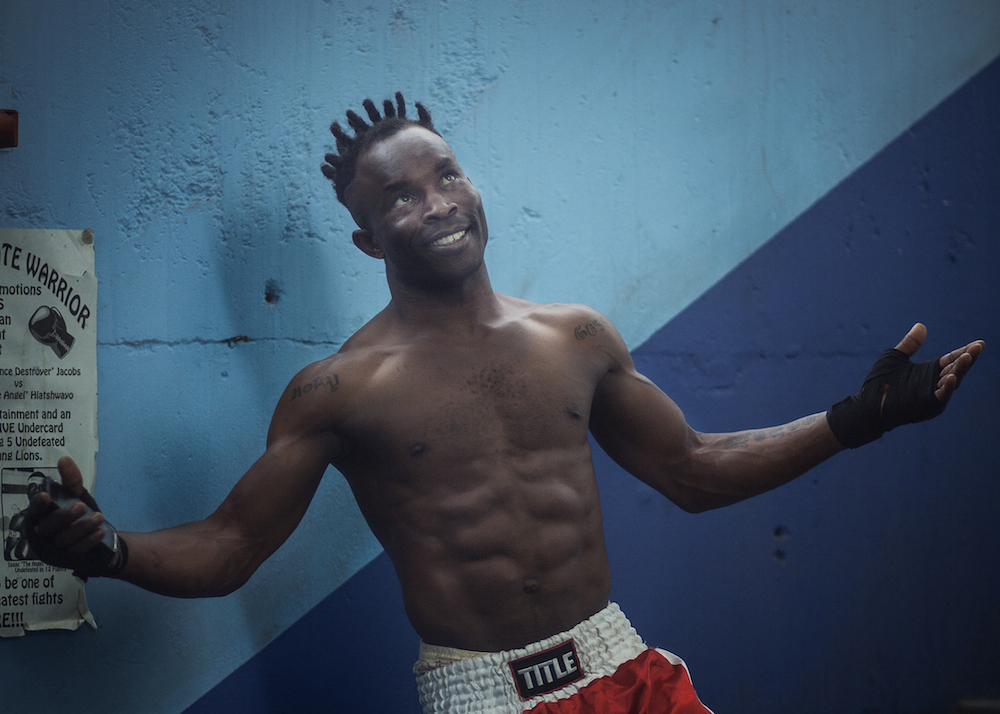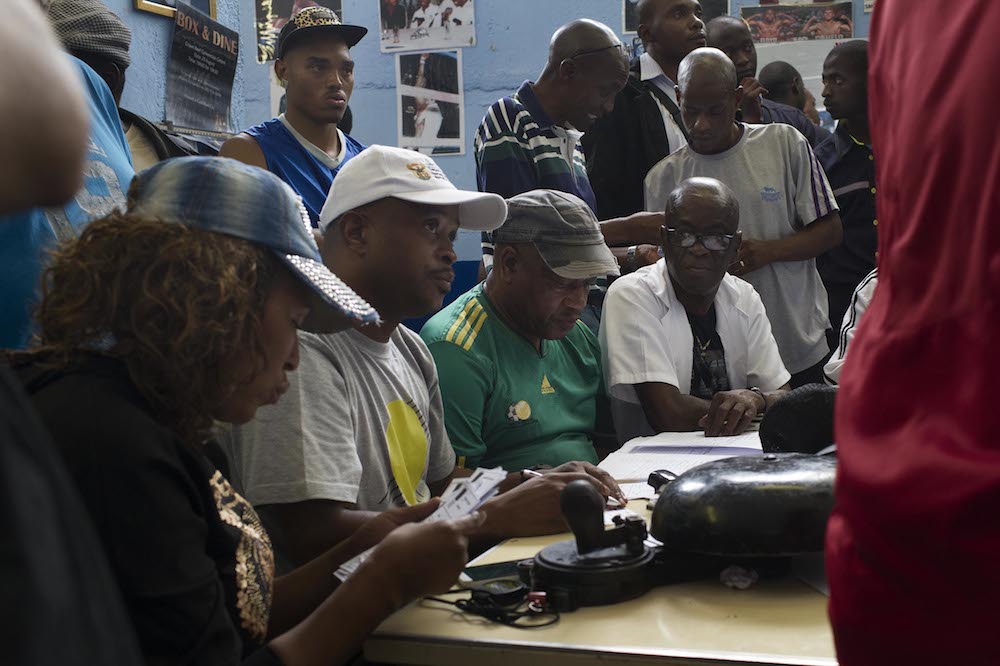One-two: Boxers gravitate to the boxing gym in the basement of the Wembley Arena in Turffontein
In the middle of the night recently, Wilson Mokoena woke, trudged to the highway and stuck out his thumb. He needed to travel up to Johannesburg from Mangaung township outside Bloemfontein for a morning of sparring at Manny Fernandes’s gym in Turffontein, and he needed to get there quickly.
If he was successful in the eyes of the judges, he’d qualify for his professional licence. A pro licence might allow him to leave his post at Transnet Freight Rail and so, with little sleep and on an empty stomach, he braved the early morning chill, taking the highway north to a morning of sparring with a bunch of other hopeful young men.
Manny’s gym is in the basement of the Wembley Arena, an intimate stadium with unblemished white pine floors that has been known to host professional basketball and some handball in its time. You gain access to the gym down a flight of whitewashed stairs and notice immediately a sloped wall on one side. The gym is directly beneath the tiered seats of the arena and the walls give everything a tilting claustrophobia, as though you’re in the bowels of a listing ship. This is softened slightly by the colours on the walls, two cheerful hoops of contrasting blue, but despite the efforts to brighten things up, it’s hard to forget where you are for very long. Bodies are tightly packed, the air is rank with too much sweat and willed bravery, and there is that sinister buzz and excitement that comes from a group of men watching something violent and illicit.
Spectral faces
The ring itself, weather-beaten with age, its bandage-clad ropes unravelling, is squared into the basement’s corner. The walls are dominated on one side by an almost life-size cut-out of Don King, the bombastic impresario, huckster and self-proclaimed legend, on another by a line of covers of Ring magazine. Above the covers are a series of small, grubby windows. East-facing, they allow morning light to pour generously into the gym and every so often you see the blurred shape of a face gazing down quizzically at the clinches and inconclusive eddies of action. Looking upwards at the spectral faces, bathed in their halo of light, it is possible to understand what makes boxing’s languid craft so endlessly fascinating, of how men will always box and always be tempted to stop and watch it whenever the occasion allows.
Larger-than-life Nigerian
After hitchhiking up from Mangaung, it was Mokoena’s misfortune to be drawn against Harrison Ajaelu-Johnson, a larger-than-life Nigerian also sparring for his pro licence at this once-a-year parade. Ajaelu-Johnson, who lives in Johannesburg’s city centre and trains at the Hillbrow Boxing Academy, ultimately hails from Imo State in southeast Nigeria, having arrived in South Africa in 2013. He has a broad, flat face with prominent cheekbones, bulging biceps and a Mohawk that crests his skull and gives him an air of simmering menace. As befits a boxer with attitude, Ajaelu-Johnson is not shy to peddle his talents. He talks quickly, darting forward with quick verbal summations and statements of intent, deft rhetorical jabs. “I believe the spirit of boxing arrested me,” he says in his thick Nigerian burr. “I see myself boxing in my dreams. It’s my destiny to be a boxer, to be a representative of my country. I have what it takes to be a champion.”

The champ: Nigerian-born Harrison Ajaelu-Johnson, lives, loves and dreams boxing. (Gustav Butlex)
Ajaelu-Johnson has been at this annual ritual once before. He arrived last year and impressed the judges but was told he had to work on his technique, refine a few things, come back more rounded. He did just that, campaigning in the shadows, boxing 12 times in the year (with eight knockouts, winning three fights on points, and one loss) in the dark, nondescript venues of Soweto’s boxing underworld. After a few exploratory jabs and clinches in his bout with Mokoena, some circumspect circling, he quickly knocked him down, almost too quick for the eye to comprehend. When asked, Mokoena insists he was felled with an open glove, intimating that the knock-down was illegitimate.
The judges seem sufficiently impressed with both boxers. At the end of the morning’s proceedings, both Ajaelu-Johnson and Mokoena are awarded their professional licence. The former, with his sponsor Okoli Romanous, has big plans; Mokoena has a long way to travel, with ample time to ponder, balancing the indignity of being knocked down with the satisfaction of knowing that, as a pro, he has now entered the garden of the elect.
According to Ben Ncapai, one of the ring officials present, there are 69 participants in total at Manny’s gym, 51 of whom are awarded their licences. They come from all over Gauteng, from Kibler Park, Westbury, Hillbrow and Soweto. Some come from the North West, a handful from the Free State; there is a softly spoken Malawian hopeful called Mikey Nekhoma who lives in Extension 6, Soshanguve, hoping his drudgery in the “back of a Chinese shop” will end with a precious licence.
Some, like super heavyweight Shaun Potgieter, have pulled in from the south, the licence a formality. Potgieter, who owns an air-conditioning company, tells me his love of the sport is so great he just couldn’t stay away. He believes his two children, Shani (5) and Christo (3) are old enough now for him to venture a tentative return after his earlier retirement. He won the heavyweight title at the South African Championships in 2010 before calling it a day but, as they say, he has the craving. Anton Nel, the current South African heavyweight champion, is in his sights.

Power play: The men and women of Boxing SA decide who has what it takes to be a professional boxer. (Fredrik Lerneryd)
Some bring nothing but their desperation. At one point a man wearing a pink golf shirt with apprehensive eyes gets into the ring. He is shouted at by one of the judges, who berates him mercilessly, accusing him of belittling the occasion with the incorrect attire. The man looks dumbfounded, an innocent fantasist who, like the white boys with crucifixes and inexpertly gelled hair, their pigeon-toed feet hopeless and fragile in their scuffed Puma boxing boots, will go home disappointed.
These pretenders are neither slick enough nor brave enough to crack a licence. You can almost see the dryness in their mouths, their quivering hearts, and you know their fear-riddled eyes hold a strange prophecy. They are already beaten, and age and skin colour and place of birth do not matter as much as what lurks inside them. The serpent of fear is their dread enemy as much as the man before them with his gloves in the air.
Boxing, more than most sports, still has a way of encouraging men to hold tight to their dreams. Keith Rass used to be Brian Mitchell’s sparring partner and now owns a transport company and a gym in Claremont, a suburb of Westbury. He loves Chelsea and Didier Drogba and attends Booysens’s Teleios Kingdom Culture Pentecostal Church every Sunday morning with his wife.
Boxing remains his greatest love. He opens his gym five nights a week and on weekends his boxers train at the University of Johannesburg. He hopes one day one of his protégés – a Gideon Buthelezi or Leroy Williams – will get boxing back to the halcyon days he remembers. If they don’t, he’ll still carry on turning off the lights and locking his gym’s door: like many in the profession, it’s all he knows.